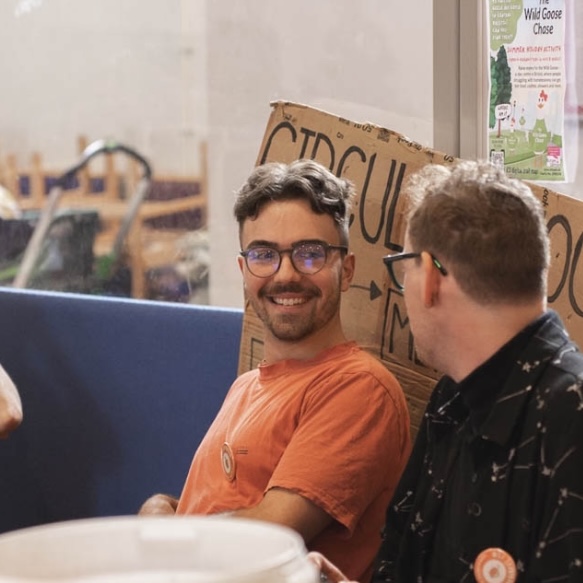The Food Waste Hierarchy: Turning Waste into Soil And Community
- Alex Montgomery
- Nov 9, 2024
- 4 min read
Updated: Dec 26, 2025
By Alex Montgomery
Founder of Generation Soil CIC
Doctoral Researcher in Food Systems, Soil & Behaviour Change
Why Food Waste Matters More Than We Think
Every year, nearly one third of all food produced globally is wasted. In the UK alone, millions of tonnes of food end up in bins, where it breaks down and releases methane, a greenhouse gas far more potent than carbon dioxide.
Reducing food waste is one of the fastest, most effective ways to cut emissions, protect soils, and support communities. But meaningful action requires more than good intentions. It requires a framework.
That framework already exists. It’s called the food waste hierarchy.
Understanding the Food Waste Hierarchy
The food waste hierarchy shows the most effective actions for reducing waste, ranked from highest to lowest impact. Think of it as a ladder. The higher you climb, the greater the benefit for people, planet, and soil.
The four key stages are:
1️⃣ Prevention
2️⃣ Redistribution
3️⃣ Composting
4️⃣ Landfill (last resort)
This hierarchy doesn’t just reduce waste. It reshapes how we value food, soil, and community.

Prevention: Stop Food Waste Before It Starts
Prevention sits at the top of the hierarchy because it saves everything at once. Food, money, energy, water, and soil.
Simple prevention actions include:
Planning meals and shopping lists
Storing food correctly to extend freshness
Using leftovers creatively in soups, stews, and smoothies
Research shows that meal planning alone can reduce household food waste by up to 20 percent. When this knowledge is shared through community workshops, those savings multiply across entire neighbourhoods.
When we prevent food waste, we also prevent the waste of the soil, labour, and resources that produced it.
Redistribution: Feed People, Not Bins
When food can’t be prevented, the next priority is redistribution.
Edible surplus food should feed people, not landfills.
Food banks, community fridges, and redistribution networks connect surplus meals from homes, schools, and businesses with people facing food insecurity. In the UK, organisations like FareShare and Neighbourly redistribute millions of meals each year.
At a local level, community fridges do more than reduce waste. They reduce stigma, build trust, and strengthen social ties.
Redistribution reminds us that sustainability is not just environmental. It is social.
Composting: Turning Waste into Living Soil
When food can no longer be eaten, it still has value.
Composting transforms unavoidable food waste into nutrient-rich compost that feeds soil life and closes the loop between consumption and regeneration.
At Generation Soil, we turn Bristol’s food scraps into living compost through the Bristol Living Compost Project, a decentralised community composting network that turns food waste into living soil.
Healthy compost is rich in beneficial microorganisms that:
Restore soil fertility
Improve water retention
Build climate resilience
Community gardens using high-quality compost can produce up to 30 percent more food while supporting pollinators and biodiversity.
Composting is also one of the most accessible actions people can take:
Use a small kitchen caddy for daily scraps
Ferment food waste with bokashi to prevent odours
Compost locally through community hubs
When we compost, we don’t just recycle. We regenerate.

Landfill: The Absolute Last Resort
Sending food waste to landfill should be avoided wherever possible.
When food breaks down without oxygen, it produces methane, one of the most powerful greenhouse gases. Every tonne of food waste diverted from landfill saves approximately 2.5 tonnes of CO₂ equivalent emissions.
By prioritising prevention, redistribution, and composting, we drastically reduce both emissions and ecological harm.
Landfill is not a solution. It is a symptom of a broken system.
Education as the Catalyst for Change
Lasting change begins with understanding.
Many people want to reduce food waste but don’t know where to start or feel overwhelmed by conflicting advice.
At Generation Soil CIC, we bridge this gap through hands-on food and soil education workshops. Our sessions in Bristol explore:
Composting at home and in flats using bokashi
How food waste connects to soil health and climate
How to start or join local composting initiatives
Workshops don’t just transfer knowledge. They build confidence, relationships, and collective momentum.

Decentralised Composting Hubs: Local Soil Solutions
Decentralised composting hubs are small, community-run sites where residents bring food scraps for local composting. These hubs:
Reduce transport emissions
Create local jobs and volunteering opportunities
Produce compost for gardens, allotments, and food forests
Reconnect people with soil
Our Bristol Living Compost Project is one example. Every week, members collect food waste across the city and transform it into living compost used to grow food and restore soil health in Bristol.
These hubs are not waste facilities. They are community ecosystems.
The Ripple Effect of the Food Waste Hierarchy
When the food waste hierarchy is put into practice, the benefits ripple outward.
Environmental benefits
Reduced methane and CO₂ emissions
Improved soil structure and biodiversity
Reduced reliance on chemical fertilisers
Social benefits
More food shared within communities
Stronger local networks
Greater awareness and behaviour change
Economic benefits
Lower waste management costs
Support for local growers and composters
Reduced household food bills
Final Thoughts: Join the Movement
Reducing food waste is not just about saving scraps. It is about building a fairer, healthier, more regenerative food system.
The food waste hierarchy gives us a clear roadmap:
1️⃣ Prevent what you can
2️⃣ Share what’s edible
3️⃣ Compost what remains
At Generation Soil, we put this into practice every day through our workshops, composting hubs, and community projects.
Every bucket of food waste we collect becomes fertile ground for change.
Together, we can transform Bristol’s food waste into soil, community, and a future where nothing is wasted and everything returns to the land.




Comments